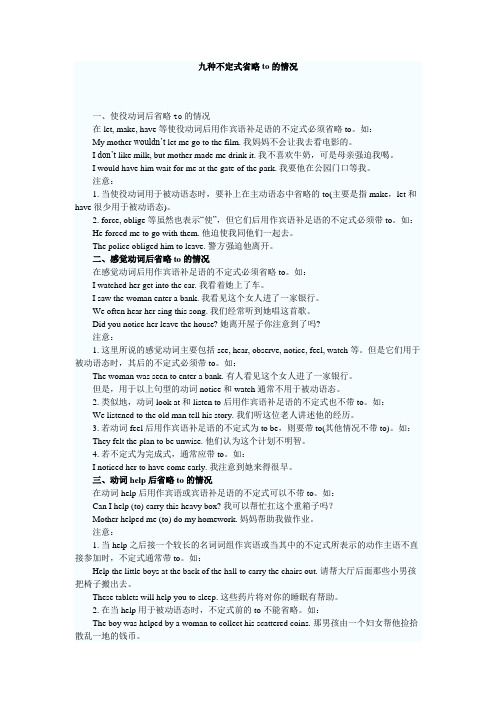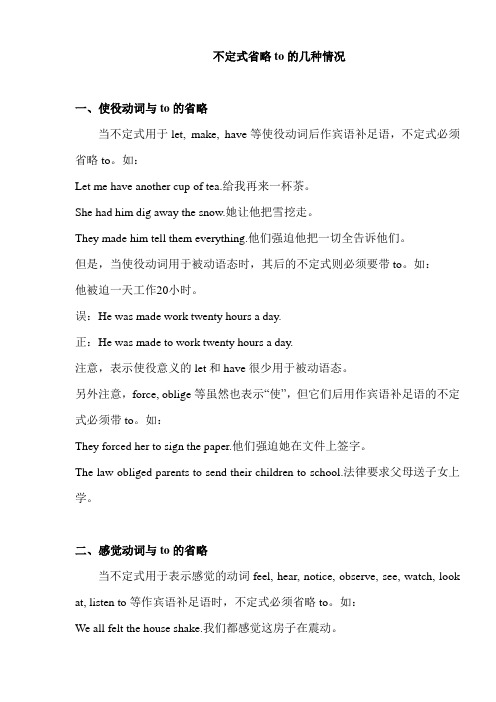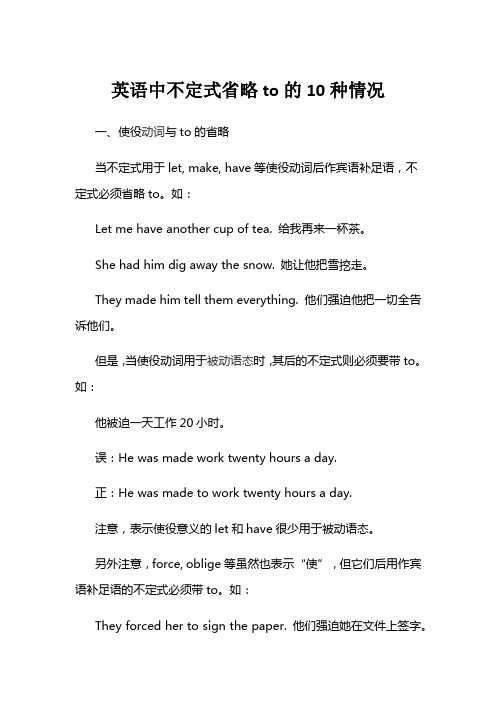不定式省略to的规则
不定式符号to的省略

不定式符号to的省略不定式符号to的省略1.不定式作宾补省to:在英语中有的动词用不定式做宾补时需要省略不定式符号to。
可以这样进行记忆如下动词:二感觉:feel;perceive二听:hear; listen to;三让:have ; let ; make [have or let及少用被动] 五看:see; watch; notice; observe; look at。
共12个。
Whenever something is wrong with you, please do let me know.I will have the students write a passage about Internet.On seeing the young child fall into the lake, John sprang to his feet, and went to the rescue.Who are you going to have type this letter for you?Who would you rather have clean the room?It seemed so long before he heard the stone hit the water.Modesty helps one make progress while conceit makes one lag behind. 谦虚使人进步,骄傲使人落后。
He did not perceive anyone come in.他没有觉察到有人进来。
如果上述动词用被动语态时,不定式符号to不能省略。
Paul doesn't have to be made to learn. He always works hard.The fat boy was made to take more exercise to lose weight.He was angry to be made to pay double the price for it.The thief was perceived to steal into the house.有人看见小偷溜进那房子里去了。
探讨省略to的动词不定式的语法规则

探讨省略to的动词不定式的语法规则
动词不定式是英语中的一种常见语法结构,而to是将动词不定式和动作的执行者隔开的符号。
但是,在某些情况下可以省略to,那么何时可以省略,何时不可以省略呢?
可以省略to的情况
1.当动词不定式作为宾语时,to可以省略。
例如:I want (to) watch a movie tonight.(我今晚想看电影。
)
2.介词后面所跟的动词不定式中的to可以省略。
例如:He refused to talk to me. / He refused talking to me.(他拒绝和我谈话。
)
3.特定动词后面的动词不定式中的to可以省略。
例如:let me know / let me to know(让我知道)
不可以省略to的情况
1.当动词不定式作为主语或表语时,to不可省略。
例如:To be or not to be, that is the question.(生存还是毁灭,这是一个问题。
)
2.在被动语态中,to不可省略。
例如:The building is going to be demolished.(这座建筑将要被拆除。
)
3.在复合宾语结构中,to不可省略。
例如:I want you to help me.(我想让你帮我。
)
综上所述,省略to的动词不定式在特定情况下是可以的,但是也需要视情况而定,不能一味地省略。
掌握好省略to的动词不定式的语法规则,可以有效提高英语的表达水平。
九种不定式省略to的情况

九种不定式省略to的情况一、使役动词后省略to的情况在let, make, have等使役动词后用作宾语补足语的不定式必须省略to。
如:My mother wouldn’t let me go to the film. 我妈妈不会让我去看电影的。
I don’t like milk, but mother made me drink it. 我不喜欢牛奶,可是母亲强迫我喝。
I would have him wait for me at the gate of the park. 我要他在公园门口等我。
注意:1. 当使役动词用于被动语态时,要补上在主动语态中省略的to(主要是指make,let和have很少用于被动语态)。
2. force, oblige等虽然也表示“使”,但它们后用作宾语补足语的不定式必须带to。
如:He forced me to go with them. 他迫使我同他们一起去。
The police obliged him to leave. 警方强迫他离开。
二、感觉动词后省略to的情况在感觉动词后用作宾语补足语的不定式必须省略to。
如:I watched her get into the car. 我看着她上了车。
I saw the woman enter a bank. 我看见这个女人进了一家银行。
We often hear her sing this song. 我们经常听到她唱这首歌。
Did you notice her leave the house? 她离开屋子你注意到了吗?注意:1. 这里所说的感觉动词主要包括see, hear, observe, notice, feel, watch等。
但是它们用于被动语态时,其后的不定式必须带to。
如:The woman was seen to enter a bank. 有人看见这个女人进了一家银行。
但是,用于以上句型的动词notice 和watch通常不用于被动语态。
不定式省略to的10种情况

不定式省略to的几种情况一、使役动词与to的省略当不定式用于let, make, have等使役动词后作宾语补足语,不定式必须省略to。
如:Let me have another cup of tea.给我再来一杯茶。
She had him dig away the snow.她让他把雪挖走。
They made him tell them everything.他们强迫他把一切全告诉他们。
但是,当使役动词用于被动语态时,其后的不定式则必须要带to。
如:他被迫一天工作20小时。
误:He was made work twenty hours a day.正:He was made to work twenty hours a day.注意,表示使役意义的let和have很少用于被动语态。
另外注意,force, oblige等虽然也表示“使”,但它们后用作宾语补足语的不定式必须带to。
如:They forced her to sign the paper.他们强迫她在文件上签字。
The law obliged parents to send their children to school.法律要求父母送子女上学。
二、感觉动词与to的省略当不定式用于表示感觉的动词feel, hear, notice, observe, see, watch, look at, listen to等作宾语补足语时,不定式必须省略to。
如:We all felt the house shake.我们都感觉这房子在震动。
I heard him go down the stairs.我听见他下楼了。
Did you notice her leave the house?她离开屋子你注意到了吗?I watched her get into the car.我看着她上了车。
但是,当feel后用作宾语补足语的不定式为to be时,则不能省略to。
省略to的不定式了解省略to的不定式的用法

省略to的不定式了解省略to的不定式的用法不定式是英语中的一种非谓语动词形式,它通常由动词原形加上to 构成,例如:to go(去), to eat(吃),to sleep(睡觉)等。
然而,在某些情况下,我们可以忽略不定式前的to,这种形式被称为省略to的不定式。
本文将介绍省略to的不定式的用法以及相关注意事项。
一、省略to的不定式主要用于下列几种情况:1. 动词let当动词let后面接不定式时,to可以省略。
例如:- She let me go to the party.(她让我去参加派对。
)2. 感官动词感官动词如see、watch、hear等后面接宾语和不定式时,to可以省略。
例如:- I heard him sing in the concert.(我听到他在音乐会上唱歌。
)3. 情态动词情态动词如can、may、must等后面接不定式时,to可以省略。
例如:- You must do your homework before playing games.(你必须先做作业再玩游戏。
)4. 动词help当动词help后面接不定式时,to可以省略。
例如:- He helped me carry the heavy boxes.(他帮我搬运沉重的箱子。
)二、需要注意的细节问题:1. 第一个动词是make、let、help、see、hear、watch或feel时,后面的动词不定式可以省略to;2. 在句子中,第一个动词是感官动词或情态动词时,后面的动词不定式可以省略to;3. 省略to的不定式只适用于动词不定式的主动形式,不能用于被动形式;4. 不定式的完整形式“to + 动词原形”通常更正式,所以在正式场合或文学作品中,建议使用完整形式。
三、案例分析:1. They helped me (to) clean the house before the guests arrived.(他们帮我在客人到来之前打扫了房间。
动词不定式省略to的9种情况

不定式省略to的九种情况一、使役动词后省略to的情况在let,make,have等使役动词后用作宾语补足语的不定式必须省略to。
如:Mymotherwouldn’tletmegotothefilm.我妈妈不会让我去看电影的。
Idon’tlikemilk,butmothermademedrinkit.我不喜欢牛奶,可是母亲强迫我喝。
Iwouldhavehimwaitformeatthegateofthepark.我要他在公园门口等我。
注意:1.当使役动词用于被动语态时,要补上在主动语态中省略的to(主要是指make,let和have很少用于被动语态)。
2.force,oblige等虽然也表示2.force,oblige“使”,但它们后用作宾语补足语的不定式必须带to。
如:Heforcedmetogowiththem.他迫使我同他们一起去。
Thepolice obligedhimtoleave.警方强迫他离开。
二、感觉动词后省略to的情况在感觉动词后用作宾语补足语的不定式必须省略to。
如:Iwatchedhergetinto thecar.我看着她上了车。
Isawthewomanenterabank.我看见这个女人进了一家银行。
Weoftenhearhersingthissong.我们经常听到她唱这首歌。
Didyounoticeherleavethehouse?她离开屋子你注意到了吗?注意:1.这里所说的感觉动词主要包括see,hear,observe,notice,feel,watch等。
但是它们用于被动语态时,其后的不定式必须带to。
如:Thewomanwasseen toenterabank.有人看见这个女人进了一家银行。
但是,用于以上句型的动词notice和watch和通常不用于被动语态。
2.类似地,动词lookat和listento 后用作宾语补足语的不定式也不带to。
如:Welistenedtotheoldmantellhissto r y .我们听这位老人讲述3.若动词feel 后用作宾语补足语的不定 式为t o b e ,t o (其他情to)。
英语中不定式省略to的10种情况

英语中不定式省略to的10种情况一、使役动词与to的省略当不定式用于let, make, have等使役动词后作宾语补足语,不定式必须省略to。
如:Let me have another cup of tea. 给我再来一杯茶。
She had him dig away the snow. 她让他把雪挖走。
They made him tell them everything. 他们强迫他把一切全告诉他们。
但是,当使役动词用于被动语态时,其后的不定式则必须要带to。
如:他被迫一天工作20小时。
误:He was made work twenty hours a day.正:He was made to work twenty hours a day.注意,表示使役意义的let和have很少用于被动语态。
另外注意,force, oblige等虽然也表示“使”,但它们后用作宾语补足语的不定式必须带to。
如:They forced her to sign the paper. 他们强迫她在文件上签字。
The law obliged parents to send their children to school. 法律要求父母送子女上学。
二、感觉动词与to的省略当不定式用于表示感觉的动词feel, hear, notice, observe, see, watch, look at, listen to等作宾语补足语时,不定式必须省略to。
如:We all felt the house shake. 我们都感觉这房子在震动。
I heard him go down the stairs. 我听见他下楼了。
Did you notice her leave the house? 她离开屋子你注意到了吗?I watched her get into the car. 我看着她上了车。
但是,当feel后用作宾语补足语的不定式为to be时,则不能省略to。
动词不定式省略to的9种情况

动词不定式省略to的9种情况在感觉动词后,不定式作宾语补足语时,通常省略to。
例如:I saw him leave the room.我看到他离开房间。
She heard the ___ ___.她听到孩子们在花园里唱歌。
I felt the ground ___.我感觉到地面在我脚下震动。
注意:感觉动词后的不定式如果有自己的宾语,则不省略to。
例如:I saw him to leave the room.我看到他离开房间。
注意:1.当help之后接一个较长的名词词组作宾语或当其中的不定式所表示的动作主语不直接参加时,不定式通常带to。
例如:Help the little boys at the back of the hall to carry the chairs out.请帮大厅后面那些小男孩把椅子搬出去。
These tablets will help you to sleep.这些药片将对你的睡眠有帮助。
2.在当help用于被动语态时,不定式前的to不能省略。
例如:Help is needed to clean up the mess.需要帮助清理这个混乱。
___ ___.Fourth。
n of "to" after "why (not)。
"___ infinitive after "why (not)。
" cannot be followed by "to"。
For example。
"Why go with him?" and "Why not ask the teacher?" In the sentence "Why not try to expand your story into a novel?"。
it should be "Why not try expanding your story into a novel?"Fifth。
- 1、下载文档前请自行甄别文档内容的完整性,平台不提供额外的编辑、内容补充、找答案等附加服务。
- 2、"仅部分预览"的文档,不可在线预览部分如存在完整性等问题,可反馈申请退款(可完整预览的文档不适用该条件!)。
- 3、如文档侵犯您的权益,请联系客服反馈,我们会尽快为您处理(人工客服工作时间:9:00-18:30)。
不定式省略to的规则
山东省民族中等专业学校赵敏焦燕
不定式一般带有符号to,它不能单独作谓语,在省去to以后,可以与助动词、情态动词一起构成合成谓语。
这是常见的用法。
此外,在下列情况下,不定式也需将to省掉。
1、不定式与一些固定词组构成合成谓语时,必须省去to。
常见的固定词组有:
had better 最好
would/had rather+v(than+v) 宁可(前者),也不(后者)
would/had sooner+v(than +v)
can/could not but 不得不,禁不住,非……不可
can/could not choose but
do nothing but+v 只是
do no/not more than+v 仅仅
could do nothing else than+v 不得不
2、在一些表示感观、使役意义的动词后面跟不定式作宾语补足语时,不定式须省去to。
常见的有:make, let, have;see,watch,notice,look at ,observe;hear,listen to ,help,feel等。
3、在介词but,except,besides,than等前面若有实意动词do时,常用不带to的不定式作介词宾语。
如果没有do,不可省to。
例如:
Tom did nothing except clean the dishes.
He did nothing else than laugh.
What do you like to do besides swim?
He seldom goes there except to look at Mary.
4、在动词help后面跟不定式作宾语时,常常省去to(也可以带to)。
例如:
Can I help carry it for you?
They often help ( to ) sweep the floors.
5、在主–系–表句型中,如果句中主语部分有实意动词do,作表语的不定式可以省去to。
例如:
All she did was turn off the light.
6、在go,come,run,hurry up,stay,wait,try等词之后常用“and+不带to的不定式”。
在这一结构中,and后的不定式起目的状语作用。
它主要用于祈使句,也可用在陈述句中。
Go and tell them to stop talking.
Come and have a rest.
Stay and have dinner.
Try and get some water.
7、and,or可以连接并列的不定式,第二个不定式前通常省去to ;另外在第一个不定式后跟多个结构上并列的不定式时,通常第一个不定式带to,后
面的可省去to。
例如:
In the old days, he never got enough to eat or wear.
Youngsters should dare to think, speak and act.
We are anxious to learn from other countries and share their experience.
8、在以why或why not开头的句子中,why(not)之后不定式不带to。
例如
Why not go out for a walk?
Why do you come here so late?。
